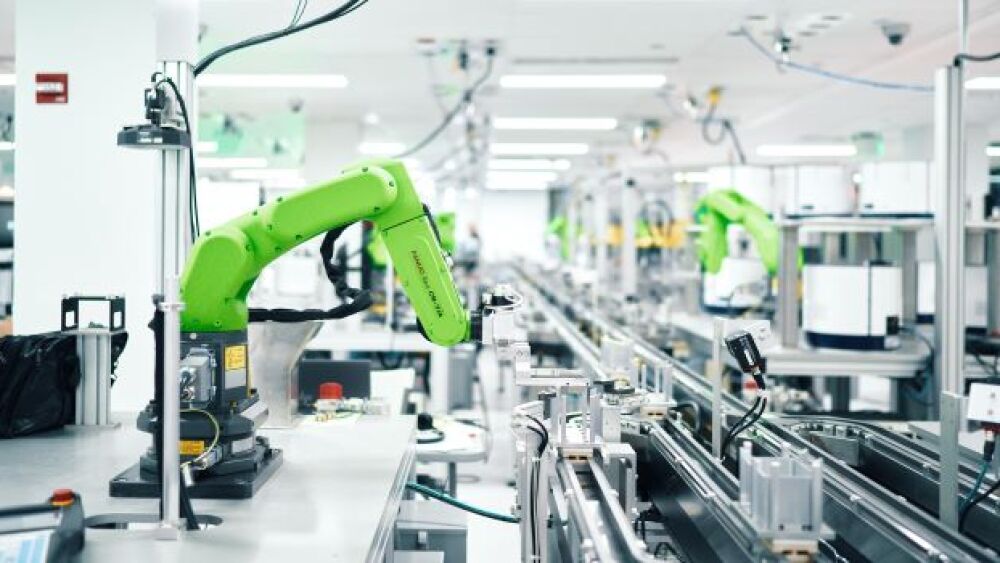Ginkgo Bioworks partnered with Merck on engineered enzymes for use as biocatalysts for Merck’s active pharmaceutical ingredient (API) manufacturing programs.
Courtesy of Ginkgo Bioworks
Ginkgo Bioworks partnered with Merck to use engineered enzymes as biocatalysts for Merck’s active pharmaceutical ingredient manufacturing programs, the companies announced Tuesday.
Ginkgo will engineer up to four enzymes for Merck. The company will use its cell engineering and enzyme design expertise. It will also use its abilities in automated high throughput screening, bioinformatics and manufacturing process optimization to identify optimal strains to Merck’s specifications.
Ginkgo notes that biocatalysts are more sustainable, effective and cost-effective than some chemical synthesis steps used in industrial chemical synthesis. It does so by reducing synthesis and purification steps.
In this case, Ginkgo plans to use its proprietary fungal strains and technology platforms to identify and manufacture the enzymes.
“Ginkgo’s fungal strains present a major opportunity for improving biocatalysis,” stated Behzad Mahdavi, SVP of biopharma manufacturing and life sciences tools. “E. coli is currently the mainstay host for expressing enzymes, but a large number of enzymes will not express properly in E. coli, and those that do express in E. coli may have better homologs that only express in fungal strains.”
The “enzyme optimization project with Merck has the potential to help reduce the cost of goods and enable a more robust supply chain for APIs,’ he added.
Under terms of the partnership, Merck will pay Ginkgo an undisclosed upfront research and development fee. Gingko is also eligible for various milestone payments, both R&D and commercial. The commercial milestones could reach $144 million in aggregate.
Ginkgo calls itself “The Organism Company.” It uses a variety of engineered microorganisms to manufacture a wide range of products in a broad swath of industries. This includes biopharma, biosecurity, food and agriculture, and industrial chemicals.
In September, the Biden Administration announced new investments into biotechnology and biomanufacturing. Part of that initiative includes $30 million for expanding biomanufacturing for APIs, antibiotics and basic materials to manufacturing drugs and to respond to pandemics.
The Department of Defense launched the Tri-Service Biotechnology for a Resilient Supply Chain program that includes more than $270 million over five years. The DoD is also investing $1 billion in bioindustrial domestic manufacturing infrastructure over five years, and the U.S. Department of Agriculture will provide $500 million in grants to support independent, innovative and sustainable fertilizer production using advances in biotechnology and biomanufacturing.
More Momentum for Ginkgo
Gingko has been on a buying spree lately. Earlier this month, it acquired Circularis and Altar. Circularis focuses on circular RNA (circRNA) and has a screening platform to increase cell and gene therapy treatments for rare diseases.
France-based Altar has a proprietary adaptive evolution platform, which Gingko plans to integrate into its “foundry” to serve Ginkgo’s customers across multiple industries, including health care. Altar’s technology platform can sustainably adapt microorganisms to conditions required by industrial companies for commercial-scale projects.
Anna Marie Wagner, SVP of corporate development at Ginkgo Bioworks, told BioSpace Ginkgo is always looking for new technologies to improve its own capabilities for its clients.
In late August, Ginkgo acquired certain epidemiological data infrastructure assets from Baktus, a Delaware-based public benefit corporation. Ginkgo now owns proprietary datasets, modeling and analytic tools, as well as a software platform that can track, model and forecast epidemics and related risks and impacts. It plans to integrate several ongoing epidemiological analysis projects and a team of epidemiologists into its biosecurity and public health initiative, Concentric by Ginkgo.
In July, Ginkgo acquired Zymergen. The company indicated plans to integrate Zymergen’s core automation and software technologies to scale strain engineering capacity into its foundry, including Zymergen’s machine learning and data science tools.
And Ginkgo is no stranger to big company partnerships. In early August, it announced a breakthrough in its collaboration with Synlogic. Synlogic, in partnership with Ginkgo, developed a new drug candidate for the treatment of gout, SYNB2081. It was the second product to come out of the collaboration.
In July, Ginkgo and Bayer entered into a partnership to expand Ginkgo’s platform in agricultural biologics. As part of the arrangement, Ginkgo is acquiring Bayer’s 175,000-square-foot West Sacramento Biologics Research & Development site, team and internal discovery and lead optimization platform for about $83 million.
Also in July, Ginkgo launched a new cell programming project as part of a broader collaboration with Sumitomo Chemical Co. Sumitomo will utilize Ginkgo’s codebase and organisms engineering expertise to sustainably manufacture molecules for a range of products in a variety of industries.
In June, Ginkgo inked a collaboration pact with Novo Nordisk to develop novel expression hosts for pharma products.





